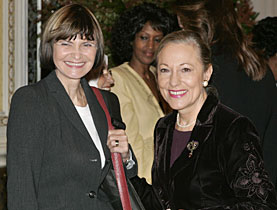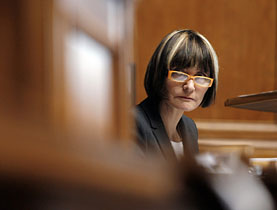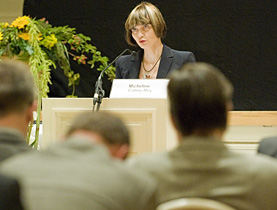Calmy-Rey restates importance of dialogue

Swiss Foreign Minister Micheline Calmy-Rey has called for more dialogue and cross-regional alliances, to meet the big challenges of today.
Calmy-Rey, who is in the United States to take part in the United Nations General Assembly, was speaking at a seminar at Harvard University on Thursday.
She said seeking dialogue did not mean tolerating unacceptable actions.
“There are red lines not be crossed: to trade on amnesty with perpetrators of genocide, war crimes and crimes is no option.”
But sometimes dialogue does lead to conflict resolution, she pointed out.
“We also are aware that dialogue is risky and success is uncertain. Refusals to dialogue with difficult actors have ended too often in a dead end.”
At a speech last month to Swiss ambassadors, Calmy-Rey sparked controversy when she mentioned the name Osama bin Laden in the same breath as dialogue.
Singling out those who took the moral high ground, she gave a list of those normally excluded from dialogue – parties involved in conflict and rogue states. She went on to pose a rhetorical question about whether countries should go so far as to sit down at the same table as al-Qaeda’s leader.
The Swiss foreign ministry was forced to issue a speedy clarification to the effect that Calmy-Rey had not said she would actually enter into dialogue with the militant Islamic group.
“In practice there is no question of the foreign ministry proposing a dialogue with Osama bin Laden,” the statement concluded.
Climate change
Calmy-Rey said that there might be cases where military force is warranted, but climate change could not be addressed with military tools and financial investment was important for development.
“But we cannot buy respect for human rights.”
She said it was crucial to address global challenges by building cross-regional alliances, going beyond cultural and traditional boundaries.
“I view Switzerland as well positioned to build such bridges.”
Calmy-Rey explained Switzerland’s foreign policy was based on promoting dialogue with difficult partners, as well as like-minded countries worldwide and partners in Europe.
“We do this because it is in our country’s long-term fundamental national interest.”
The foreign minister highlighted a Swiss initiative aimed at reducing armed violence and its negative impact on socio-economic and human development, known as the Geneva Declaration and involving more than 70 countries in all parts of the world.
Africa
She said a reduction in violence was a key element in reaching the UN Millennium goals. Women and children were the main victims of poverty and violence, Calmy-Rey said.
The initiative aims to halve the number of people living in extreme poverty and hunger by 2015. It also sets targets in education and health care.
As part of the UN General Assembly, two high-ranking conferences took place in New York this week focusing on development in Africa.
Alexandre Fasel, a senior official in the Swiss foreign ministry, said the situation was alarming, echoing a statement by the UN Secretary-general, Ban Ki-moon.
Ban appealed to rich nations to do more to help reach the Millennium Development Goals.
He announced that governments, foundations, the private sector and civil society had pledged an additional $16billion (SFr17.4 billion) for aid projects.
swissinfo, based on an article in German by Rita Emch
Foreign Minister Calmy-Rey and Environment Minister Moritz Leuenberger are representing Switzerland at this year’s UN General Assembly.
Swiss President Pascal Couchepin cancelled his visit to New York because of the health problems of another cabinet member.
Switzerland joined the UN in 2002 following a nationwide vote.
Switzerland lags behind the UN goals for development aid. In 2007 the Swiss government spent 0.4% of its GNP on aid, short of the UN target of 0.7%.
Moves are underway in the Swiss parliament to raise the contribution to 0.5% by 2015.
More than half of Switzerland’s annual aid – SFr580 million in 2007 – went to African countries.
More than SFr220 million of that went to multilateral aid, including the World Food Programme. Bilateral aid projects were funded to the tune of about SFr350 million.

In compliance with the JTI standards
More: SWI swissinfo.ch certified by the Journalism Trust Initiative


You can find an overview of ongoing debates with our journalists here. Please join us!
If you want to start a conversation about a topic raised in this article or want to report factual errors, email us at english@swissinfo.ch.